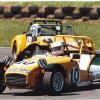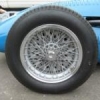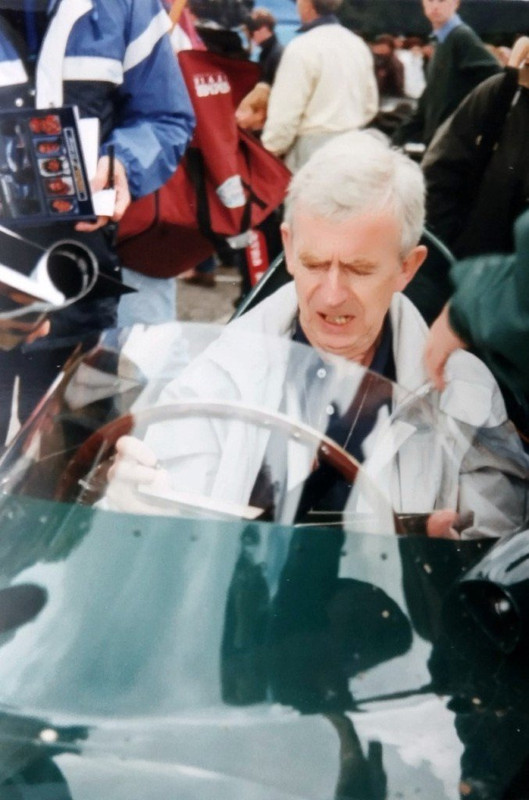It is interesting to note that, as team mates at BRM in 1961, Tony was three years younger than Graham, yet Tony was the "old hand"!
Tony Brooks
#51

Posted 05 May 2022 - 08:26
Advertisement
#52

Posted 05 May 2022 - 09:46
Reading Tony's and Pina's comments again, I do wonder if Monza 1961 was influential in the decision and also whether it's perhaps a veiled - but typically polite - criticism of Clark. Tony would have seen von Trips' fatal accident happening right in front of him.
#53

Posted 05 May 2022 - 10:54
Reading Tony's and Pina's comments again, I do wonder if Monza 1961 was influential in the decision and also whether it's perhaps a veiled - but typically polite - criticism of Clark. Tony would have seen von Trips' fatal accident happening right in front of him.
You might be on to something there. I do get the feeling that Jimmy was slightly more aggressive early in his career; perhaps he learned the patient style he later exhibited as he gained experience?
#54

Posted 05 May 2022 - 11:23
There wasn't much time involved, if that was the case...
From Monza in 1961 to Zandvoort, first round of the '62 series when he was smooth as silk in the 25.
#55

Posted 05 May 2022 - 12:02
There's a quote in The Sunday Times, 26th November 1961, sourced to Peter Berthon, that 'he believes Tony Brooks will retire from racing, for personal and business reasons, before the 1962 season starts.' Also an implication that negotiations were already well in train with Ginther at that point.
So that was presumably the impetus for the Mail report a few days later, with Berthon perhaps having let the cat out of the bag early - either deliberately or inadvertently.
I wasn't trying to imply that Clark was over-aggressive - merely that Tony and Pina might have been amongst those who felt that the crash was Jim's error and that he was perhaps trying to push too hard early in the race. At the end of the first lap he had advanced from 7th on the grid to 4th, having passed von Trips, Baghetti and Graham Hill, and had the even better-improving Brabham (who started 10th and had passed all those three and also Bonnier and Ireland) on his tail.
The suggestion that some drivers were perhaps overdoing it looks strange in retrospect - 1961 had hardly been an unusually error-strewn season in F1, although there were (as in 1960) three fatalities, of which only von Trips' was during a race, the others being Shane Summers in practice for the Silver City Trophy and Giulio Cabianca in testing at Modena.
#56

Posted 05 May 2022 - 14:46
In his autobiography, Tony Brooks gives several reasons for his retirement: his growing family and business interests, his dislike of the 1.5-litre GP cars, and (at some length) his unhappiness at his treatment by BRM that year.
There is no doubt that Jim Clark wasn't the finished article in 1961. DSJ described him a "looking almost wild" in practice at Monaco and he crashed heavily on the next lap. He was clearly already very good but it was after the South African races in early 1962 that Moss told Rob Walker he would need an equal car to beat him. Perhaps he went down to the crossroads.
Despite that, I don't think overtaking three cars on the wide open spaces of Monza can be considered pushing too hard. As always at Monza, the were running in tight groups and probably changed places several times a lap.
#57

Posted 05 May 2022 - 16:17
There wasn't much time involved, if that was the case...
From Monza in 1961 to Zandvoort, first round of the '62 series when he was smooth as silk in the 25.
Maybe the difference was the relative competitiveness of the cars he was driving?
#58

Posted 06 May 2022 - 06:16
Full page obit in The Times yesterday . I hadn't realised TB was a deeply religious man - probably common knowledge to those better versed in 50s racing than me ?
#59

Posted 06 May 2022 - 08:06
Full page obit in The Times yesterday . I hadn't realised TB was a deeply religious man - probably common knowledge to those better versed in 50s racing than me ?
I thought the Times obituary was very good. Apart from the numerous references to Vanwell. At least the spelling was consistent.
I thoroughly recommend Poetry in Motion to anyone who hasn't read it. I bought a copy 2 years ago for about 2.5 times the price when new. Worth every penny.
Advertisement
#60

Posted 06 May 2022 - 08:09
They want money for me to look at it...
I don't pay for newspapers online.
#61

Posted 06 May 2022 - 08:56
#62

Posted 06 May 2022 - 09:36
Full page obit in The Times yesterday . I hadn't realised TB was a deeply religious man - probably common knowledge to those better versed in 50s racing than me ?
I think he once said your life was not yours to throw away, but belonged to God (or words to that effect). This was while he was still racing but was maybe losing pace.
Certain BRMs must have appeared to be the work of the Devil.
#63

Posted 06 May 2022 - 10:42
I think he once said your life was not yours to throw away, but belonged to God (or words to that effect). This was while he was still racing but was maybe losing pace
Wasn't this essentially his explanation for the precautionary pitstop at Sebring after getting taffied up the chuff?
#64

Posted 06 May 2022 - 10:45
Thank you, Speedy...
It is a nice piece about him.
#65

Posted 06 May 2022 - 10:56
The article says that Tony Vandervell was a ball bearing tycoon! The Guardian obituary said the same originally but the online version has been corrected.
#66

Posted 06 May 2022 - 11:42
I thought the Times obituary was very good. Apart from the numerous references to Vanwell. At least the spelling was consistent.
I thoroughly recommend Poetry in Motion to anyone who hasn't read it. I bought a copy 2 years ago for about 2.5 times the price when new. Worth every penny.
"Having hardly practised for the race because the Connaught team did not want to risk damaging the unreliable car, Brooks hired a Vespa and learnt the circuit at 30mph. "
I thought the lack of practice was due to the lack of car with which to practice?
#67

Posted 06 May 2022 - 12:37
Brooks and BRM in 1962 are another "what if" from that pivotal year. I wonder if Brooks had a tinge of regret after watching BRM move to the front of the grid ? His parting words to BRM management were direct criticism of how he was treated, contrary to his contract, and of the management of the team. If one takes a broad view of BRM in 1962, Ginther's relative performance may be evidence that the cars entrusted to Hill and Ginther were more or less equal. If this was in fact the case, it would be fair to say that Brook's letter may have caused BRM management to revisit how the team was managed. In a broad sense, Brooks may deserve some credit for BRM success in 1962 and later. But he was too modest to even entertain such speculation.
#68

Posted 06 May 2022 - 20:17
The article says that Tony Vandervell was a ball bearing tycoon! The Guardian obituary said the same originally but the online version has been corrected.
Try 'The Daily Telegraph' obit? It could be better but hopefully adds a little more perspective...
It's just that Tony's home town Dukinfield is not in Derbyshire, as the original text read. Senile writer.
DCN
#69

Posted 06 May 2022 - 22:22
The Telegraph article is very good, though I don’t know how easy it is to access if you’re not a subscriber.
Tony Brooks says in Poetry in Motion that it was at his suggestion that Wilkie Wilkinson joined BRM. Wilkinson was never accepted by many in the team. Did that affect Brooks’ relationships? At the time Graham Hill was busy building the team around him. Poetry in Motion says he virtually lived in Bourne while Tony always believed that the driver’s job was to turn up when required but to let the engineers and mechanics get on with their job. Clearly, Hill’s approach was right for the time and place.
interestingly, Tony had a similar situation at Ferrari where Jean Behra lived in Modena and spent most of his time at the factory, although the outcome there was very different.
#70

Posted 06 May 2022 - 22:28
I wonder if the 'tiger' drive of Hill's in the British GP had an impact on the team?
Perhaps causing them to favour him over an apparently less aggressive driver...
#71

Posted 06 May 2022 - 23:28
Perhaps he was seen as a little less committed, having a recognised profession to fall back on, than Hill & Behra ?
#72

Posted 07 May 2022 - 02:15
Such sad news. Hopefully heaven has some really good race tracks and front engined F1 cars! Like others I missed seeing Tony in his race days, I do recall asking folks who knew him why he had retired at that age only to be told that he was a man who knew his own mind and it was the right thing for him. And while photos are often beguilingly deceiving, I want to look at the pictures that Doug posted of Pina looking at him and Allan L posted of him with that smile, and think that Tony had a really good life.
#74

Posted 07 May 2022 - 06:00
Excellent obituary in the Daily Telegraph including this....
What was most impressive was the rare quality of his wins. His 1958 Belgian, German and Italian GP victories were the most coveted crowns, contested upon exceptionally demanding circuits. While Spa-Francorchamps in Belgium was motor sport’s scary Eiger, the Nürburgring in Germany was its Everest, and Monza in Italy its Annapurna.
#76

Posted 07 May 2022 - 08:22
Regarding Tony's disappointment with his year at BRM, an excellent point is made above that despite his previous success and experience he was actually younger than established Graham Hill who had become established within the team - and, not least, totally established with chief engineer/team manager Tony Rudd - through 1960.
Tony's natural reserve and his 'turn up and drive' philosophy meant he would always have been vulnerable to older Graham's infinitely more involved commitment and absolutely more assertive personality. Graham's constantly-involved technical approach, which endeared him so much to Tony Rudd, made him very much part of the coming generation of F1 drivers, not the old. In contrast, Tony's more Corinthian approach was absolutely rooted in the customs and habits of the 1950s and of being a gentleman driver in effect. He believed that engineers engineered, drivers drove. It cost him.
Having been scorched in 1956 by BRM's then variable preparation, and the consequent hazardous reliability of its cars, Tony B was VERY chary of committing himself to such a risk again in '61.
That's why he was so insistent they adopt higher standards which he believed he could trust. He had no faith their standards had already been improved, and Dan Gurney's 1960 Dutch GP crash - which killed that poor boy spectator - reinforced his belief, the accident being caused by a brake system failure. That was why he put so much faith in Wilkie Wilkinson, believing that Wilkie's Ecurie Ecosse Le Mans record proved his capability to put out safe cars. But here was Tony making a judgement on the basis of 1950s experience and evidence.
Wilkie was indeed engaged by BRM largely to secure Tony's signature on a driver contract. But Wilkie tended very much towards being a legend in his own mind.
His unconsciously bombastic approach upon arrival instantly estranged the majority of BRM's mechanic team, and his assumption they were all inferiors, working to inferior standards, estranged Tony Rudd, and Graham too. Tony Rudd was willing to learn from 'The Master', but within days concluded that Wilkie really was trading on bygone reputation and little more. After an early test session to set-up the latest cars Wilkie concluded they had got them handling right, so that's us for the entire forthcoming season. We don't change a thing from here on. That's how it had worked with the one-ton EE Jaguar sports cars.
Tony Rudd (and especially Graham) were simply staggered by such outdated thinking.
Wilkie was then enraged when Rudd (enthusiastically encouraged and backed by Graham) arrived for races on different circuits with a huge range of alternative spring and anti-roll bars with which to tailor the cars to each course. That was anathema to the older man. Wilkie was effectively sidelined, and was soon quietly transferred to being the team's salesman meeter and greeter...
Meanwhile Tony Brooks - keeping out of engineering matters - progressively realised he'd backed not necessarily a wrong'un, but someone whose presence was doing more to divide the team than positively unite and improve it. But I believe his competitive inner pride balked at admitting as much, to himself. So he interpreted Tony Rudd and Graham really ignoring Wilkie and going their own way, as being more them simply ganging up against Wilkie, and therefore against change...and against him.
That made the intra-team atmosphere tricky, and Tony - never one for confrontation - more or less kept quiet except when specifically asked to make his views known, as he finally did (too late) to team owner Alfred Owen. Against this background the fact that Tony's results were what they were is a tribute to his innate skill behind the wheel, because he was seldom a happy chap that year.
I think the basic truth is that Tony B was a temperamentally and essentially a racing driver from the 1950s, whereas Graham and Tony Rudd were much more in tune with the demands of racing on into the 1960s.
And when those new 1 1/2-litre F1 cars with their 4-cylinder Climax engines, proved so under-powered, dull and uninteresting to drive - yet still subject to the ever-present dangers of serious injury and death (von Trips and all those poor spectators at Monza '61), Tony B accepted that racing had simply moved away from him - it wasn't fun any more - and it posed more angst than buzz. So he finally removed himself from it.
DCN
#77

Posted 07 May 2022 - 09:12
It might be worth a repeat of the story behind Tony Brooks's 1955 Syracuse drive. I met John Riseley-Prichard on business in 1966. At that time he was a landlord in Bayswater, West London. Obviously I asked him about Brooks, and Riseley-Prichard said Brooks was reluctant to accept Connaught's offer of a drive, because he was revising for crucial dental exams. I had the impression he believed that Brooks really wouldn't have gone without his (Riseley-Prichard's) persuasion.
That reluctance is more characteristic of the modest and likeable person he appeared to be, than of the borderline obsessive and driven nature of many top drivers. Perhaps he was more of an "artist at the wheel" and less of a "fierce competitor" than his contemporaries.
#78

Posted 07 May 2022 - 09:34
Re the 'fierce competitor' aspect - certainly true, until he got behind the wheel. But he added the rare capacity to keep that ferocity always smooth and stylish... At risk of becoming boring, fine driver, fine man.
DCN
#79

Posted 07 May 2022 - 12:54
Reading about him now, thanks! I just wish I had taken more care about his skills and ability in period.
It is so easy to be there without understanding and appreciate the skill and sacrifices happening before your very eyes......
RIP
Richard
Advertisement
#80

Posted 09 May 2022 - 17:33
Full page obit in The Times yesterday . I hadn't realised TB was a deeply religious man - probably common knowledge to those better versed in 50s racing than me ?
In his autobiography Tony makes extensive reference to being raised as a Roman Catholic, he attended a Convent primary school and then A jesuit run boarding school... short of being schooled at the Vatican a more Catholic upbringing would be hard to contemplate! ![]()
#81

Posted 09 May 2022 - 17:42
Having deovoured your every word on B.R.M Doug youve put it all in a nutshell... in the North we'd call Wilkie 'a proper gobshite' .... I often wonder if 'motosport valley' had been in Lancashire or Yorkshire how different things might have been?
Regarding Tony's disappointment with his year at BRM, an excellent point is made above that despite his previous success and experience he was actually younger than established Graham Hill who had become established within the team - and, not least, totally established with chief engineer/team manager Tony Rudd - through 1960.
Tony's natural reserve and his 'turn up and drive' philosophy meant he would always have been vulnerable to older Graham's infinitely more involved commitment and absolutely more assertive personality. Graham's constantly-involved technical approach, which endeared him so much to Tony Rudd, made him very much part of the coming generation of F1 drivers, not the old. In contrast, Tony's more Corinthian approach was absolutely rooted in the customs and habits of the 1950s and of being a gentleman driver in effect. He believed that engineers engineered, drivers drove. It cost him.
Having been scorched in 1956 by BRM's then variable preparation, and the consequent hazardous reliability of its cars, Tony B was VERY chary of committing himself to such a risk again in '61.
That's why he was so insistent they adopt higher standards which he believed he could trust. He had no faith their standards had already been improved, and Dan Gurney's 1960 Dutch GP crash - which killed that poor boy spectator - reinforced his belief, the accident being caused by a brake system failure. That was why he put so much faith in Wilkie Wilkinson, believing that Wilkie's Ecurie Ecosse Le Mans record proved his capability to put out safe cars. But here was Tony making a judgement on the basis of 1950s experience and evidence.
Wilkie was indeed engaged by BRM largely to secure Tony's signature on a driver contract. But Wilkie tended very much towards being a legend in his own mind.
His unconsciously bombastic approach upon arrival instantly estranged the majority of BRM's mechanic team, and his assumption they were all inferiors, working to inferior standards, estranged Tony Rudd, and Graham too. Tony Rudd was willing to learn from 'The Master', but within days concluded that Wilkie really was trading on bygone reputation and little more. After an early test session to set-up the latest cars Wilkie concluded they had got them handling right, so that's us for the entire forthcoming season. We don't change a thing from here on. That's how it had worked with the one-ton EE Jaguar sports cars.
Tony Rudd (and especially Graham) were simply staggered by such outdated thinking.
Wilkie was then enraged when Rudd (enthusiastically encouraged and backed by Graham) arrived for races on different circuits with a huge range of alternative spring and anti-roll bars with which to tailor the cars to each course. That was anathema to the older man. Wilkie was effectively sidelined, and was soon quietly transferred to being the team's salesman meeter and greeter...
Meanwhile Tony Brooks - keeping out of engineering matters - progressively realised he'd backed not necessarily a wrong'un, but someone whose presence was doing more to divide the team than positively unite and improve it. But I believe his competitive inner pride balked at admitting as much, to himself. So he interpreted Tony Rudd and Graham really ignoring Wilkie and going their own way, as being more them simply ganging up against Wilkie, and therefore against change...and against him.
That made the intra-team atmosphere tricky, and Tony - never one for confrontation - more or less kept quiet except when specifically asked to make his views known, as he finally did (too late) to team owner Alfred Owen. Against this background the fact that Tony's results were what they were is a tribute to his innate skill behind the wheel, because he was seldom a happy chap that year.
I think the basic truth is that Tony B was a temperamentally and essentially a racing driver from the 1950s, whereas Graham and Tony Rudd were much more in tune with the demands of racing on into the 1960s.
And when those new 1 1/2-litre F1 cars with their 4-cylinder Climax engines, proved so under-powered, dull and uninteresting to drive - yet still subject to the ever-present dangers of serious injury and death (von Trips and all those poor spectators at Monza '61), Tony B accepted that racing had simply moved away from him - it wasn't fun any more - and it posed more angst than buzz. So he finally removed himself from it.
DCN
#82

Posted 09 May 2022 - 18:29
Full page obit in The Times yesterday . I hadn't realised TB was a deeply religious man - probably common knowledge to those better versed in 50s racing than me ?
Tony Brooks and fiancee Pina did request separate hotel rooms when travelling together before they were married, according to "Poetry in Motion". His religious beliefs were fairly well known, including his point of view regarding taking risks with a poorly or hastily prepared car (BRM throttle linkages!) wherein he states that he believes life is a gift from God.
By all accounts, a true gentleman. And one of the very greatest racing drivers. At ten years of age, at my first Grand Prix, I stood in awe as he reeled in the Ferraris of Collins and Hawthorn at the Nurburgring in 1958. Victories at Spa, Nurburgring and Monza...utterly brilliant.
#83

Posted 09 May 2022 - 18:34
Hmm - in my judgment, the above comment on Wilkie is just too harsh...
He came from a generation in which mechanics were regarded very much as private soldiers, while their drivers were often the car owners and their self-perception was that they formed an officer class. The average mechanic was addressed by his surname only, while they were expected to touch the brim of their flat caps and address the driver as 'Mr' or 'Sir'. The better mechanics - and the better drivers - might aspire to first name terms. Wilkie built a good reputation and fell into that category. He also drove a bit, and that elevated him a little further. Postwar he re-emerged as a well-known ex-Brooklands personality. With Ecurie Ecosse he built his own reputation, some of it by merit. But a majority of EE mechanics with whom I talked in later years recalled him as living largely on bygone achievements. They also complained of his constantly playing to the media. In his immaculate BRDC-badged overalls if ever anyone had a camera handy, he would be there, they said, front and centre.
In his defence, he was always friendly and apparently cheerful and very informative, so the gentlemen of the press rated him highly. I believe the attention both sought and received, all accumulated to the extent that he genuinely (and understandably) began to believe his own publicity.
That publicised image is pretty much what Tony B bought into, and what BRM employed. That's why the reality of Wilkie really being a nice enough bloke, at times perhaps a little too full of himself, but very much out of his depth by the 1960s and living on past experience (and knowledge, to be honest) - came as a disappointment.
Wilkie did a reasonably good job as BRM's 'go to' front man for private customers of obsolete team cars, and he worked really quite effectively with Matra and Rover on their BRM-related projects. He lived in what had been Peter Berthon's cottage and ended up as part of the BRM operatioon at Bourne, but one who was held at arm's length by its core Formula 1 operation. A pleasant personality of considerable pre-war and 1950s achievement, but not a natural 1960s chief mechanic, team manager, racing director - as he seemed to want to be. Perhaps, therefore, he just was not especially self-aware...?
In that, he was absolutely not alone. He was still a great British motor sporting character, and one to be recalled with considerable affection, and all due respect.
DCN
#84

Posted 09 May 2022 - 19:33
Please forgive me if this is inappropriate but as someone who likes things "just so"...
Wikipedia are claiming that Brooks died in Dukinfield (without a source), which I find incredulous. Surely, it will either be at his home in Ottershaw or at the closest hospital. The trouble is, when I now try and find out, all the websites that blindly copy Wikipedia are saying Dukinfield.
Has anybody seen any information at all to advise?
#85

Posted 10 May 2022 - 09:28
On the subject of misinformation I was surprised to see the following in this otherwise excellent article by Gordon Cruikshank in Motor Sport:
"Though a multiple grand prix winner and victorious in sports cars at Le Mans and the Nurburgring, he did not radiate self-importance."
From what I've read Tony came to hate the Le Mans 24 hours (I believe it was part of his Ferrari contract in 1959 that he would not race there) and he certainly never won there.
#86

Posted 10 May 2022 - 10:14
Vanwall's withdrawal at the end of 1958 was a huge disappointment to Tony Brooks and Stirling Moss. The impact of it is noticeable in contemporary interviews. Tony's appearances for the ad-hoc team in 1959 and 1960 indicate his loyalty and sentiment for Vanwall.
























